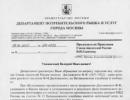Association of State Scientific Centers “Science. Where to study for robotics? Information on universities and specialties Research experimental base
(TsNII RTK)
short information
Leading scientific organization in the field of creating means of technical cybernetics and robotics for space, air, land and sea-based. The main scientific and technical areas of activity of the Central Research Institute of the RTK are mechatronics and robotics, intelligent control systems, photonic and optoelectronic equipment, special and space instrumentation, laser technologies, space technologies, information and control systems and simulators. Among the Institute's developments are instruments information support soft landing and life support systems spaceships, mobile robotic complexes for special applications and security, radiation control and monitoring devices, vision systems for the protection and management of facilities, network processors (screens) and information security systems, automated laser technological complexes for high-performance processing of materials.
Founded (created)
The institute was founded in 1968. In 1994, the Central Research Institute of the RTK was awarded the status of the State Scientific Center Russian Federation, preserved to the present by the relevant regulations of the Government of the Russian Federation (1997, 2000, 2002, 2004, 2007, 2009, 2011, 2013).
Work on priority areas and critical technologies for the development of science, technology and technology
Performs work in priority areas: "Security and counter-terrorism", "Promising types of weapons, military and special equipment", "Transport and space systems”, “Information and telecommunication systems”, “Nanosystems industry”, “Rational nature management”, “Life sciences” and critical technologies: “Basic and critical military and industrial technologies for creating promising types of weapons, military and special equipment”, “Biomedical and veterinary technologies", "Nano-, bio-, information, cognitive technologies", "Technologies of information, control, navigation systems", "Technologies for monitoring and predicting the state environment, prevention and elimination of its pollution", "Technologies for the prevention and elimination of natural and man-made emergencies", "Technologies for the creation of high-speed vehicles and intelligent control systems for new types of transport", "Technologies for the creation of rocket-space and transport equipment of a new generation".
Participation in the implementation of technology platforms
The Central Research Institute of the RTK is the co-coordinator of the technological platform "Technologies of mechatronics, embedded control systems, radio frequency identification and robotics".
Innovation projects
Multifunctional mobile robotic complexes for conducting radiation reconnaissance and carrying out technological operations in conditions radiation exposure. Conceptual design of intelligent navigation systems and group control of mobile robotic complexes. Alpha-beta-gamma radiometer. Portable visualization system for gamma radiation sources. Photon altimeters and soft landing control systems spacecraft. Perspective transport and handling system for space applications. Modular robotic systems for space exploration. Intelligent vision systems for safety. Network-centric systems for controlling constellations of planetary robots from aboard manned orbital stations. Specialized manipulation system.
Research experimental base
Unique complex stands for space and ground robotics, photonic technology and its components, including a stand for simulating weightlessness and testing large objects (included in the List of unique installations of the Russian Ministry of Education and Science). Center for collective use of scientific equipment "Laser, optical and test complex". Center for Microrobotics and Technical Cybernetics of the Federal Security Service of Russia.
Patents, certificates
115 patents and certificates (29 for inventions, 19 for utility models, 67 for computer programs).
Number of staff engaged in research and development
579 people, including 2 academicians of the Russian Academy of Sciences, 1 corresponding member of the Russian Academy of Sciences, 5 doctors of sciences, 30 candidates of sciences.
Availability of agreements with higher education institutions
St. Petersburg Poly Technical University Peter the Great, State Scientific Research Testing Institute of Military Medicine" of the Ministry of Defense of the Russian Federation, St. Petersburg State University aerospace instrumentation, Moscow University of Technology, Physical-Technical Institute named after A.F. Ioffe, Samara State Technical University, National Research Tomsk State University, Southwestern State University, Tambov State Technical University.
Basic departments, scientific schools
At the Central Research Institute of the RTK, the departments of the St. Petersburg State Pedagogical University - "Mechatronics and Robotics" and "Telematics" operate
Scientific schools: "Photon technology", "Extreme robotics", "Special instrumentation", "Laser technologies", "Telematics".
Main partners
The Institute cooperates with institutes of the Russian Academy of Sciences (IMASH RAS, SPII RAS, IAPU FEB RAS, IPMech RAS, M.V. Keldysh Institute of Applied Mathematics RAS, etc.), Russian universities (SPbPU, SUAI, SPbGMTU, ITMO University, SPbGETU (LETI), VKA named after A.F. Mozhaisky, BSTU "VOENMEH" named after D.F. Ustinov, MSTU named after N.E. Bauman, MSTU "STANKIN", NRU "MPEI", MIET, SFU), scientific organizations and industrial enterprises (JSC RSC Energia named after S.P. Korolev, FSUE TsNIIMash, FSUE KB Arsenal, FSUE TsAGI, JSC MZ Arsenal, JSC Central Design Bureau MT Rubin, JSC RCC-Progress, JSC Zavod Tula, GKNPTs named after M.V. Khrunichev, LLC NPP Advent, CJSC NTC Rokad, NPO Special Materials, TsTSS).
International scientific and technical cooperation
Foreign partners of the Central Research Institute of RTK are Nissan Motor, the Institute of Robotics and Mechatronics of the DLR, the Chinese Space Agency and a number of other foreign firms and organizations.
The idea of creating our own building for the now Central Research Institute of Robotics and Technical Cybernetics (TsNII RTK) arose in Leningrad at the turn of the 1960s and 70s, when a Special Design Bureau (OKB) was created on the basis of the Polytechnic Institute for the needs of the defense industry. The place was not chosen by chance: just not far from the Polytechnic University (only 2 km), surrounded by Sosnovka Park and Benois Garden (got its name in the 21st century, and then it was part of the Lesnoye state farm, before the revolution there was a summer farm of the architect Julius Benois ). Surrounded by greenery and next to the main building - just what you need for classified work: the Soviet Design Bureau created systems for spacecraft (Soyuz, Luna-16, Buran). At the time of the construction of the building, Leningrad was actively growing with new sleeping areas, and the futuristic skyscraper could become a local landmark surrounded by the monotonous "panels" of the Kalininsky district.
The project of the building was developed in 1973 in the style of "Soviet modernism" that prevailed in the 1960-80s. Construction dragged on for a long 16 years, which, according to one of the authors of the project, Stanislav Vasilyevich Savin, now an honored architect of the Russian Federation, "actually a very long time for the seventies and eighties". The facility at the corner of Tikhoretsky and Svetlanovsky prospects began to be built under Brezhnev, and completed under Gorbachev. During this time, the OKB became an independent institution.
True, the author himself refers the project to a different style. "The building of this institute was my first work as part of a team of authors. Our teacher Sergei Borisovich Speransky oversaw the entire process. If you remember, in 1975, Soviet architects had just begun to try their hand at postmodernity - probably, this is also why I was especially It is interesting to work on this project. Then I felt that this style would be a kind of turning point in domestic urban planning and, unlike typical Soviet housing construction, would become a "lifeline", and, perhaps, a kind of "breakthrough" of Leningrad architecture", - said Stanislav Savin in an interview with Ardis magazine (No. 48, 2011).
The building complex has the shape of a cross in plan, slightly curved in the western part. The dominant feature is a 77-meter tower in the form of a "concrete tulip", located on a hill in the southern part and facing two avenues. There is a huge laboratory for testing space technology (the Buran manipulator was located there). Together with the antenna, completed in the 1990s, the height of the building is almost 105 meters.
The 4-story main building rests on a 1-story pedestal and looks dynamic due to the smooth curve along Tikhoretsky Prospekt. Tape glazing is complemented by "breeze-salts", a system of vertical lintels, which partially protects the premises from sunlight, which is already not too much in the Northern capital. The part of the building facing east, on Svetlanovsky Prospekt, is a 2-story "ship" hanging over the ground and semi-underground rooms and resting on tall thin columns.
The article was prepared by Pavel Kuznetsov for the site
Field photos were taken by the author specifically for the site in July 2016.
Based on materials from ipetersburg.ru, citywalls.ru, d-c.spb.ru and spb.kp.ru
Robotics is a promising industry for at least the next ten years, because robots have become part of the new industrial revolution. It includes knowledge of mechanics, electronics and programming. Studying at a university provides not only skills and fundamental knowledge, but also the opportunity to work on real projects. Knowledge of mathematics and physics are the fundamental skills of specialists who want to create smart machines. On the basic level robotics relies on functions and equations. Even an ordinary robot vacuum cleaner uses complex mathematical functions to build a route around the room.
Where to study robotics?
Robotics is a promising industry for at least the next ten years, because robots have become part of the new industrial revolution. It includes knowledge of mechanics, electronics and programming. Studying at a university provides not only skills and fundamental knowledge, but also the opportunity to work on real projects.Knowledge of mathematics and physics are the fundamental skills of specialists who want to create smart machines. At a basic level, robotics relies on functions and equations. Even an ordinary robot vacuum cleaner uses complex mathematical functions to build a route around the room.
The Robot found out where in Russia you can get knowledge in this area. We also talked with the students, they told us why they entered robotics and whether they were satisfied with their studies at their university. The direction "Mechatronics and Robotics" corresponds to the specialty code 15.03.06, however, robotics can be taught in other areas, for example, "Automation of technological processes and production" (15.03.04). And all areas of training, one way or another related to mechanical engineering, begin on 15.XX.XX. At the same time, artificial intelligence technologies and the basic foundations of robotics can be learned in the areas of the group "Mathematics and Mechanics" (01.XX.XX) or "Computer and information sciences» (02.XX.XX).
To find out what disciplines will be studied during the four years of study, it is enough to find the curriculum of the program. This is easy to do: enter the name of the program and university in the search engine, add “curriculum” at the end.The curriculum will help you get an idea of what you will be doing for the next 4 years. It is also useful to read information about partner companies of the department or faculty on the pages of interested programs. Most often, universities have signed an internship agreement with these companies and there are agreements on the employment of students after graduation.
Below we have prepared a table with information on admission to one of the leading universities in Moscow, St. Petersburg and other regions of Russia.
Moscow
| Faculty | Direction | Entrance tests | Passing score in | Number of budget places | |
| 2017 | |||||
| MSTU im. N. E. Bauman | Special engineering | Mechatronics and Robotics (Robotic systems and mechatronics) | R M F | 271 | 92 |
| Mechatronics and Robotics (Underwater robots and vehicles) | R M F | 247 | |||
| Robotics and integrated automation | Automation of technological processes and production | R M F | 264 | 51 | |
| MTU | Mechatronics and Robotics | R M F | 217 | 48 | |
| NRNU MEPhI | Physical and technological | Mechatronics and robotics in the nuclear industry | R M F | 10 | |
| MPEI | Institute of Power Engineering and Mechanics | Computer control technologies in robotics and mechatronics | R M F | 217 | 27 |
Mikhail, Moscow Power Engineering Institute
I entered MPEI because my friends graduated from the university, and I often hear about him positive reviews. At the university they give good knowledge in mathematics and engineering graphics, it is believed that MPEI is almost the best in this. Our lectures are attended by students from other universities. Before that, he studied at MIIT, he did not live up to expectations at all. Now I am delighted with my institute. Unlike many other universities, we are not loaded in the humanities, and the key subjects are related to mechanics.
We don't really study programming languages: there was a slight fling with C++ and that's it. And it is difficult to implement your projects, because there is no person who will help with advice, no good equipment, no good access to existing equipment. If we talk about the quality of education, then in the previous semester we had pairs in one subject, our headman, who himself does not understand anything about this. There is no involvement and encouragement to create projects - this is really frustrating at the university. Little practice, tons of theory. Without the application of knowledge, all this is forgotten at once.
St. Petersburg
| Faculty | Direction | Entrance tests | Passing score in | Number of budget places | |
| 2017 | |||||
| Saint Petersburg State University of Information Technologies, Mechanics and Optics | R M I | 255 | 56 | ||
| Control systems and robotics | Digital production | R M I | no data | 10 | |
| St. Petersburg State University | Mathematical and mechanical | Mechanics and mathematical modeling | R M I | 249 | 20 |
| Applied Mathematics and Computer Science | R M I | 254 | 45 | ||
| SPbSPU | Institute of Metallurgy, Mechanical Engineering and Transport | Robotics | R M F | 223 | 50 |
| BSTU "VOENMEH" D.F. Ustinov | Information and control systems | Mechatronics and Robotics | R M F | 202 | 36 |
| GUAP | Institute innovative technologies in electromechanics and robotics | Robotics | R M F | 213 | 17 |
R - Russian language, M - mathematics, F - physics, I - computer science and ICT
Alexey, ITMO University
As a child, I liked to collect simple electrical circuits. Bulbs from flashlights, LEDs from lighters, motors from players - everything went into business.
At school, I got acquainted with programming, which also interested me. Robotics is an area in which, as it seemed to me, both of the above-mentioned directions of my interests are realized. So by the end of ninth grade, I decided to get higher education at ITMO University.
Expectations from the university were not justified. Having only one desire, but not having sufficient knowledge, there was nothing to do at the university. The naive assumption that the university would teach me turned out to be wrong. The university only provides an opportunity to study.
ITMO teaches robotics according to several standards at different departments . At the Department of Control Systems and Informatics (SUiI), where I studied, the theory of automatic control is at the forefront. There are several courses on mechanics, mechatronics, materials and their processing.
Programming is considered a skill in the CS&I department, so you need to learn languages on your own. The main tool is Matlab and Simulink. In the course of training, C, Assembler, CFC will be affected.
During the training, I had the opportunity to work with LEGO Mindstorms and Beckhoff. The design office also has KUKA, Roomba, Boe-Bot, TRIK, Intel Galileo, Raspberry Pi and everyone is very passionate about ROS. The Design Bureau (KB) is a voluntary business.
AT educational program there are no such projects. You can independently join a design bureau or laboratory and conduct a project on their basis. This is done freely, and subsequently you can work in the laboratory for a salary.
The quality of education is difficult to assess. Since it is the opportunity to get an education, and not education as such, that is given. A very large role is played independent work. So with the ability to study independently, you can leave the university as a very good specialist. In the absence of such skills and an insufficient level of self-organization, on the contrary, one can come out as a nobody.
I was waiting to be taught everything. Take by the hand and lead me into the world of my dreams. They will present on a silver platter all the knowledge that is not in my head, chew it properly, and put it in my mouth. This did not happen. Therefore, I very soon hit hard on reality. I lacked knowledge, mainly in the field of mathematics. I lacked discipline. And I was absolutely incapable of assimilating the material on my own. But I did not admit my unsuitability, so by inertia I sunk to receiving a bachelor's degree and entering a master's program. In graduate school, I was already able to recognize the lack of potential in myself and graduated of my own free will.
Vasily, BSTU "VOENMEH" named after A.I. D.F. Ustinov
I went to university to study radio engineering. Expectations from the university were justified, I studied only one semester, therefore, apart from general subjects, nothing much has been studied so far. Now the main emphasis is on mathematics, programming (we studied Pascal, will be C) and physics.
So far, I'm only studying at the university. I work at the Robotics Center at PFML No. 239. He participated in a bunch of all sorts of competitions, from the last - he was preparing with the team for [email protected], where I work on the hardware part of the project.
Now there are a lot of "extra" items. For me, this is the so-called mandatory point that I have to go through in order to be able to do something further. There is also a benefit, but at this stage there is little of it.
I am not 100% sure that I will stay in robotics, although I am interested in electronics, and I will definitely do it. Robotics is a combination of many factors, where electronics is important, but you won't get far without the rest.
Regions
| Faculty | Direction | Entrance tests | Passing score in | Number of budget places | |
| 2017 | |||||
| TSU (Tomsk) | Physical and technical | Mechatronics and Robotics | R M F | 221 | 25 |
| applied mechanics | R M F | 202 | 25 | ||
| TPU (Tomsk) | Institute of Cybernetics | Mechatronics and Robotics | R M F | 219 | 40 |
| UrFU (Yekaterinburg) | Institute of New Materials and Technologies | Mechatronics and Robotics | R M F | 201 | 25 |
| Tyumen State University (Tyumen) | Institute of Mathematics and Computer Science | Mechatronics and Robotics | R M F | 16 | |
| NSTU (Novosibirsk) | Mechanical and technological | Robotic systems and complexes | R M I | - | 0 |
| Mechatronics and Automation | Power industry and electrical engineering | R M F | 204 | 102 | |
| FEFU (Vladivostok) | School of Engineering | Automation of technological processes and production (in mechanical engineering) | R M F | 143 | 20 |
| Mechatronics and Robotics | R M F | 189 | 15 | ||
| SGTU im. Gagarina Yu.A. (Samara) | Institute of Electronic Technology and Mechanical Engineering | Intelligent Robotics | R M F | 200 | 17 |
| SFU (Krasnoyarsk) | Polytechnical Institute | Mechatronics and Robotics | R M F | 153 | 18 |
R - Russian language, M - mathematics, F - physics, I - computer science and ICT
Alexey, Tomsk Polytechnic University
From school he was interested in physics and was going to become an engineer, choosing between nuclear physics and robotics. As a result, I chose robotics, based on the fact that the direction has been actively developing recently and there are many interesting tasks.
Expectations from the university were partially justified. At our university, more attention is paid to the theory of control and industrial automation, as well as to the electric drive. From programming languages, we studied C, Matlab and Python. As creative project in the first year we worked with the Lego Mindstorms platform, and in the second year we studied the Festo Robotino platform.
In my third year, I became interested in machine learning. Since then, he has been implementing traffic sign recognition algorithms as research work students, had an internship at the Tomsk branch of NTR Lab, where we worked on projects in the field of deep learning, and as a final work I participate in the team for developing a transport robot with the functions of recognizing people and following selected targets.
The university has young teachers who are interested in implementing projects in robotics, so if you wish, there is an opportunity to participate in the implementation of interesting ideas.
Unfortunately, the program at our university is somewhat outdated, so you have to get up-to-date knowledge on your own. On the one hand, this gives a good experience of self-education, but on the other hand, outdated items give an extra load. At the same time, TPU teaches good fundamental knowledge in the field of the theory of automatic control and electric drive.
In my opinion, our university pays little attention to computer science and, in particular, machine learning. When studying programming languages, such important sections as the theory of algorithms and data structures are missed. Machine learning, which is a fairly common thing in modern robotics, is unfortunately not taught.
For now, I intend to continue to develop in the field of machine learning, but with a shift to the server side of web development. But it is possible that I will also participate in some project in the field of robotics.
Anatoly, YarGU im. P.G. Demidov
As a child, I was always attracted to robots. I wanted to learn how to make them myself. But there was no specialty of robotics in the city. I decided to enter the university with a degree in radiophysics and electronics (as it was called). I thought that by learning how to work with electronic components I can make robots.
It so happened that at one of the departments they began to work on a mobile manipulator (a small 3-link manipulator mounted on a caterpillar platform). We have already worked on the management of the platform. But students were needed to manage it. I became one of them. And as a result, he defended his diploma on the development of a manipulator control algorithm.
Since I entered the Faculty of Physics, we were taught theory to a greater extent. There are also applied specialties, for example, radio engineering and infocommunication technologies. Without general physics, mat analysis, differential equations did not work out. Otherwise, the rest of the material would not be understood. Studied analog and digital electronics, theory of circuits and signals.
At our faculty, programming is perceived as a way to solve the problems of modeling various radiophysical processes. And, proceeding from this, we were taught not programming itself, not the art of writing programs, but through programming they explained the essence and mechanisms of processes. And we did it on Turbo Pascal. They demanded from us not a beautiful code and a fast running program, but the correct output of data for any initial conditions. They studied object-oriented programming in Delphi, but they also taught the basic essence on it. There were also more specific modeling environments (Mathcad, Matlab). There was a course on programming microcontrollers in assembler.
I think that for this specialty such courses are quite enough. Most importantly, what was being studied was not a specific programming language, but the principle of how to get the computer to perform the necessary actions. And it helped me a lot in the future to learn almost on my own C for programming AVR microcontrollers and C # to create a control program with a graphical interface. Of course, the level at which I studied languages is purely amateur, but it is enough to solve problems.
At the department where I studied (now it is called Infocommunication Technologies), if a student had an idea, then it was definitely promoted. Because it is much more pleasant to do what is interesting. So their projects were very encouraged. Especially if the project was interesting and useful not only for the student.
I was engaged in the control algorithm of manipulators. The task was to solve the inverse kinematics problem for a specific model that was in the department and implement it on a microcontroller (a microcontroller is needed to control the servos that rotate the manipulator links). As a result, I got a robot that could be controlled manually through software installed on a computer or using a keyboard, gamepad, touch screen and leap motion - a device that determines the position of a person's palm above itself. Implemented autonomous modes: from the banal shifting of objects, like a conveyor robot, to drawing letters and words.
They teach well at the university. Teachers know their subject, they know how to tell and explain it to the student. Everything I wanted from my studies, I got. And my dream came true to make a robot, even though it is not yet smart enough.
After graduating from the university, I did not start working in robotics, because there is no work in this area in Yaroslavl (except for education), and I did not want to move.
Louise, Moscow State University M. V. Lomonosov (branch in Tashkent)
I entered the branch of Moscow State University at the Faculty of Applied Mathematics and Informatics to learn how to program. In fact, it turned out that they mainly teach mathematics. Many subjects, ranging from mathematical analysis and linear algebra and ending with the equations of mathematical physics. But we are going through programming and now we are studying C ++, before that we studied C, got an idea about Assembler and web development. The load at the university is huge, while the quality of education could be better. There is not enough time to study something outside, however, I will continue to do robotics.
Where else to look for universities?
« Study.ru » - the largest catalog of universities and curricula in Russia and abroad. On the portal, you can choose the specialty you are interested in, compare programs, find out the cost of education, passing scores and admission conditions. Almost everything you need to know to make a list of universities and directions.
The second site - "Apply online » - helps to assess the chances of entering the chosen university or specialty. With the help of the USE calculator, you can find out the possible options.






